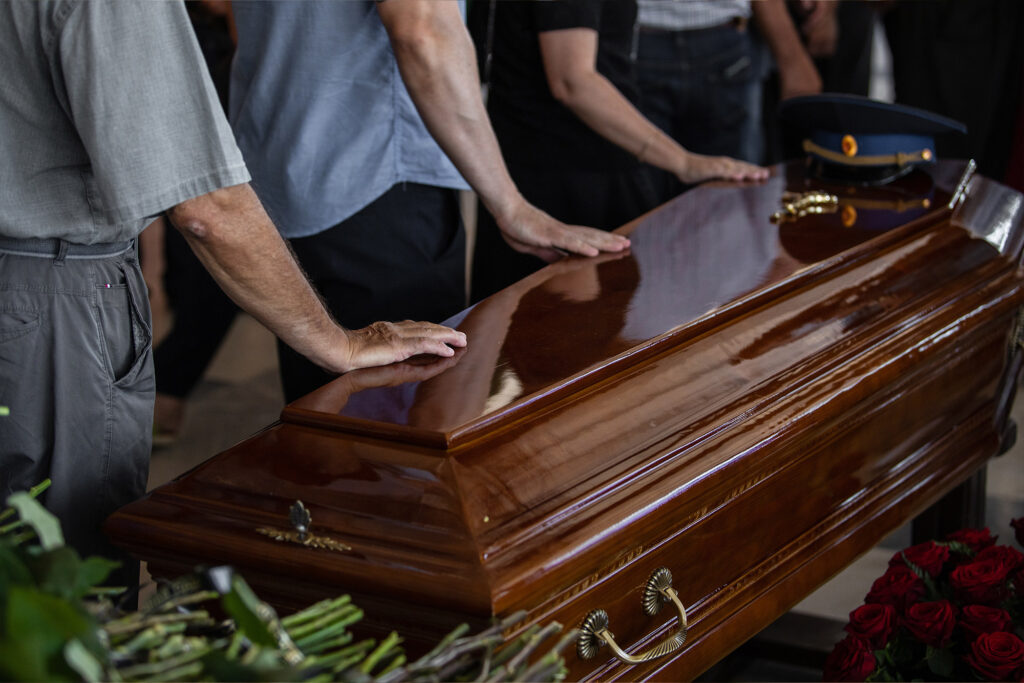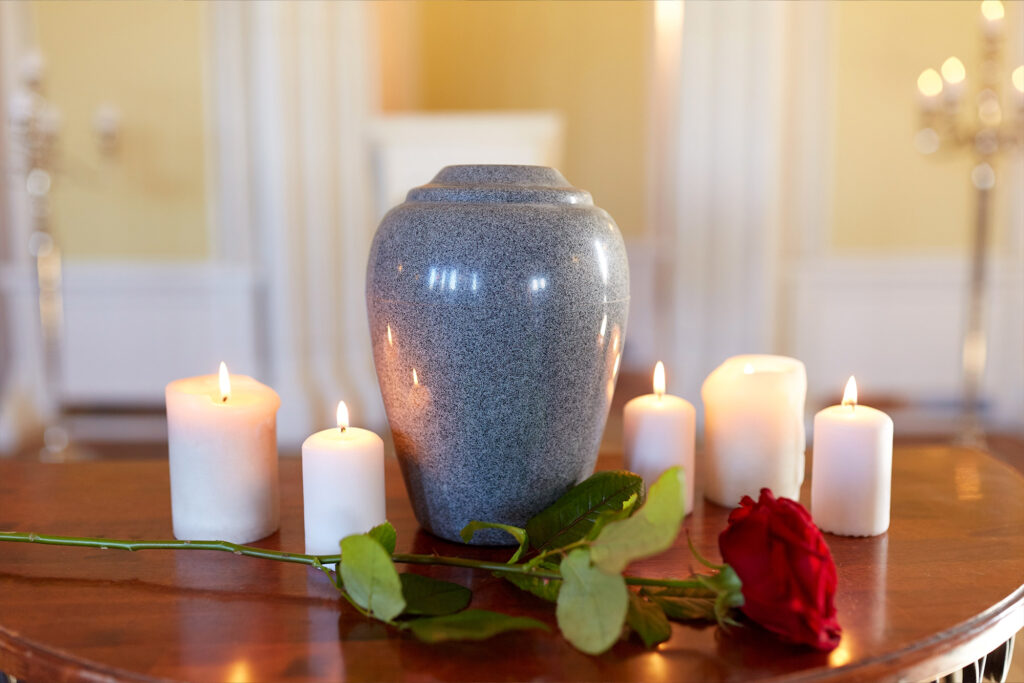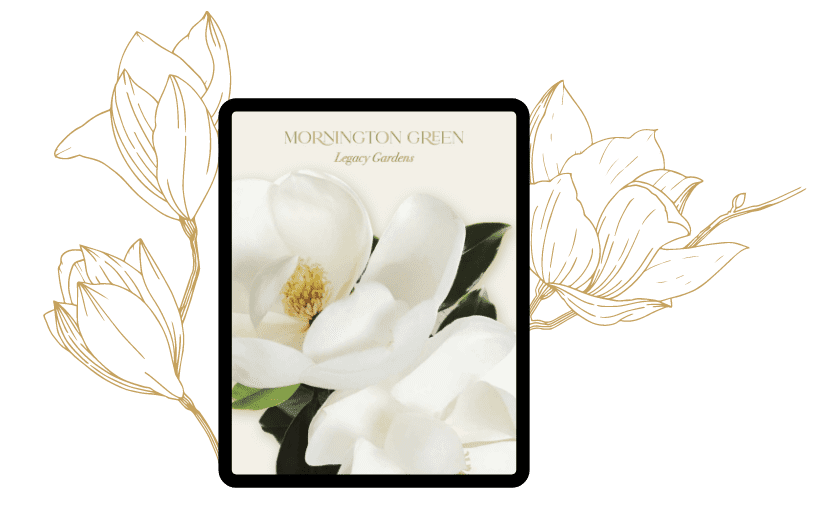Death is a natural part of life that all of us will have to face at some point. So, when we do pass away, it is important that our loved ones know that everything’s been taken care of so that they can focus on what’s important — celebrating the life we had.
Here at Mornington Green, our team loves making a positive impact on the planet, but we also love helping people like you make the right decision that’s best for their families (even if that decision isn’t us). In this article, we’re going to go over why someone might choose cremation over a burial (or vice versa), and important factors when making your decision, including:
Funeral Costs: One of the key considerations when selecting between cremation vs burial is the expense. How much do you need to prepare?
Carbon Footprint and Environmental Impacts: More and more people are becoming increasingly concerned about the environmental impact of death, and understandably so.
Practicality and Flexibility: These two aspects are key factors when holding your funeral.
Religion and spirituality: The difference between cremation and burial with respect to funeral rituals has different purposes depending on religion, time and place.
Cremation vs Burial: What’s the difference?
Cremation and burials are two options that you can choose for how your remains will be handled after you pass away. They both have their advantages and disadvantages, so it’s important to understand their differences before making a decision.
The main difference between cremation and burial comes down to how the body is treated after its passing. A cremation involves incinerating the body, with the remaining ashes given to the family to keep, bury in the ground or scatter in a place of relevance. With a burial, the body remains intact and is laid in a coffin before its interment into the ground.

Burials
Burial is often called the “traditional” full-service funeral. This one involves viewing or visitation, a formal funeral service, the use of a hearse to take the body to the funeral site and cemetery, and burial and interment of the remains.
Pros
- The Christian, Jewish, and Muslim faiths often prefer a burial.
Most religions prefer burial, as they believe the soul must be reunited with the body in the afterlife.
- Older generations prefer a burial because it is considered more traditional.
When it comes to funerary customs, older generations are more likely to prefer burials because they tend to be more conservative regarding their views on life, death, and the afterlife. They like that their loved ones will be placed in the ground with them and will rest with them for eternity. This is a comforting thought for older generations who believe their children will be reunited with their parents after death.
- The body can be exhumed if necessary.
For example, if someone wants to be buried in a family plot and later their family moves elsewhere, it is possible for the deceased to be exhumed and reburied in a new location. This simply is just not possible for people who have been cremated with ashes scattered.
- You can still see your loved one’s body for one last time.
Burials allow a few days of viewing and visitation and are normally held a few days after the person has died. Most of the time, the funeral is held in a cemetery after a church or chapel service.
Cons
- More expensive than cremation.
A traditional burial would include funeral home professional service fees, standard third-party fees, headstone costs, interment fees and grave liner fees. Since a traditional burial involves a range of relatively time-consuming activities, it is estimated that the cost of an average burial is around $19,000. If you decide on a more elaborate funeral, the fees can be significantly higher.
- Harmful to the environment.
With traditional burials, embalming is used to keep the body intact so that friends and family can say their last goodbyes at a “viewing” service. This slows down the rate of decay. Even though the idea is thoughtful, the chemicals used in this process are very powerful and toxic. Some of the toxic substances in the embalming solution are formaldehyde, menthol, phenol, and glycerin.
Moreover, the casket is usually made of wood, steel, copper, bronze, and other valuable materials. Some people spend a lot of money on a casket that will be buried and never used again.
We are in fact running out of space to bury people and we are losing ecosystems to create these cemeteries. The average city has a cemetery footprint twice the size of our CBD in most cities.

Cremation
For cremation, the body is burned and reduced to ashes without embalming shortly after death with this type of funeral.
Typically, an urn or other container is used to hold the cremated remains. Depending on the family’s personal choice, no viewing or visitation is required with this type of funeral.
After cremation, the ashes can be stored in the home, buried in a crypt or niche in a cemetery, or scattered in the deceased’s favourite spot or somewhere memorable. You can choose from different containers, often determined by what kind of ceremony you’d like to hold and how much money you want to spend. The most common options include plastic containers, wooden boxes, and metal urns, but there are also more creative options like wind chimes or jewellery holders that come in all shapes and sizes.
For us at Mornington Green, the ashes can be infused into a tree using patented Living Legacy Ash Treatment.
Pros
- Cremation is cheaper than burials
Cremation is more affordable than a burial in most cases.
On average, cremation costs $7420 and includes everything necessary: the complete cremation process and death certificates, cremation certificates, flowers, newspaper notices, booklets, and so on.
The cost of cremation could be even lower again if a family chooses direct cremation to memorialise their loved ones. Moreover, because a direct cremation does not require a chapel, celebrant, flowers, or other extras, prices remain affordable and can be as low as $2900 all-inclusive.
You can even find alternatives for as little as $1,500 with some budget direct cremation providers.
On average, the cost of cremation versus burial is considerably cheaper, which is helpful to know if the finances play a factor in your decision between the two.
- Eco-friendly
If you consider the environmental impact of cremation vs burial, there is a clear winner. While cremation is far from perfect due to the release of vaporised mercury, dioxins and furans, and greenhouse gases, it is an environmentally sound option due to its lower impact method of disposition. You can take measures into your own hands and reduce the impact even more if you choose simpler ceremonies, which is possible if you choose to do direct cremation.
If you choose to become a tree, Mornington Green are restoring ecosystems, soil health and creating forests that play an integral part in the carbon cycle.
- Practical and Flexible
Cremation is typically regarded as the more practical option because it does not require you to buy a burial place or a monument.
It’s also easy to transport cremated remains. Cremation also gives loved ones the time to prepare a memorial when they’re ready and at whichever spot they think is most meaningful for the person commemorated.
- Preferred by Hindus and Buddhists and younger generations
Some religions believe it speeds up the soul’s journey to reincarnation. Moreover, younger generations are more likely to opt for cremation because it is cheaper, faster and easier than traditional burial methods. Some people also prefer cremation because they do not want their loved ones to be buried underground.
Cons
- Eastern Orthodox Church, as well as Islam, Judaism, and some Christian denominations, prohibit cremation.
In some religions, cremation is considered a sin against God because it’s believed that you should bury your loved ones in the ground so they can be resurrected at the end of time. That the body is holy and should be preserved in preparation for that “resurrection.” It is believed that cremation is a way to get rid of bodies quickly or cheaply without respecting them or their lives on Earth.
- Once someone has been cremated, you can’t undo it.
The cremation process is irreversible. There is no going back.
The choice is up to you.
Is cremation better than a burial? In all honesty, it depends on you. We hope this article aided you in making that choice.
At Mornington Green, we infuse cremated ashes into beautiful trees. We’re creating beautiful forests where you don’t just become the tree, you become its flowers, you become its leaves, you become its thousands of seeds and seedlings that get perpetuated through the circle of life. Instead of connecting to what you lost, people get to connect to the flower that your life created and they get to connect to the beauty that your life created. Our hope is that people have a deeper appreciation for what it means to be alive and that your life becomes a gift that connects people to the privilege of being alive.
If you want to learn more about cremation and Mornington Green, call us on (03) 9059 4959 or reach out to us here.



